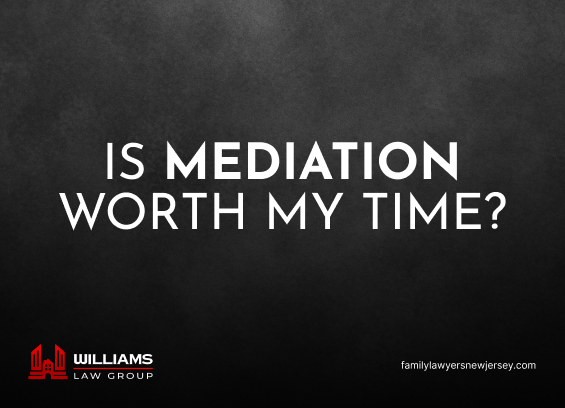New Jersey Family Law Mediation Services Lawyer
Our Law Firm Can Help Mediate Your Family Law Case
Many conflicts in families involving divorce, child custody and other family law issues can quickly escalate and become more complicated and combative. Fortunately, there are conflict resolution techniques that often help resolve such conflicts. And one of the most effective approaches involves using mediation services.
So how do mediation services work? Who chooses the mediator? And what happens if both sides can’t agree or disagree with the mediator’s suggestions? Our New Jersey family law attorneys at Williams Law Group, LLC have the answers to all these questions. That’s because we have years of experience working with mediators to resolve complex family disputes.
When you have our legal team on your side working with a mediator, you give yourself the best opportunity for resolving your family conflict. That’s because we have an in-depth understanding of New Jersey’s legal system, especially when it comes to family law conflicts.
What Is A Mediator?
A mediator is a neutral third party who works with both sides in a family law dispute with the goal of reaching a solution without going to court to decide the case. Many people choose mediation over litigation since mediation can often take less time and be less expensive.
What Types Of Family Law Cases Involve Mediation Services?
New Jersey’s court system has a formal mediation process designed to resolve a wide range of legal matters. Officially known as “civil mediation” (since the process does not involve criminal matters), a mediator can help families resolve a wide range of family law legal matters, including:
- Divorce mediation, including conflicts involving a new divorce agreement or amending an existing agreement.
- Child custody conflicts, including disagreements over parental visitation and amending such agreements.
- Disagreements involving divorced parents over the day-to-day raising of their children.
Who Chooses The Mediator In A Family Law Case?
In general, the family members involved in the dispute jointly agreed to participate in the mediation process and work together to pick an official mediator approved by New Jersey Courts. If both sides cannot agree on a mediator and want to still pursue mediation, the New Jersey judge that has jurisdiction of the case will select a meditator to work with both parties.
Is Mediation Legally Binding?
The short answer? No. Just because a mediator makes a recommendation for resolving a family law dispute does not mean that both sides have to accept the mediator’s recommendation. Instead, one or both parties can request that such legal matters be resolved through litigation (meaning going to court) or through another legal process.
How Can An Attorney Assist With A Mediation Case?
Even if you have a mediator you trust to help to resolve your legal case, it’s in your best interests to have a lawyer working with you as well to make sure your rights are respected and that you fully understand all your legal options.
Our experienced New Jersey family law attorneys fully understand how the legal system works when it comes to mediation. As a result, we can work with you and your mediator to help resolve your legal matter in the most efficient, equitable manner.
Get a New Jersey family law attorney looking out for your best interests. Contact us and schedule an appointment today. Our law firm has two New Jersey offices conveniently located in Short Hills and Parsippany.

